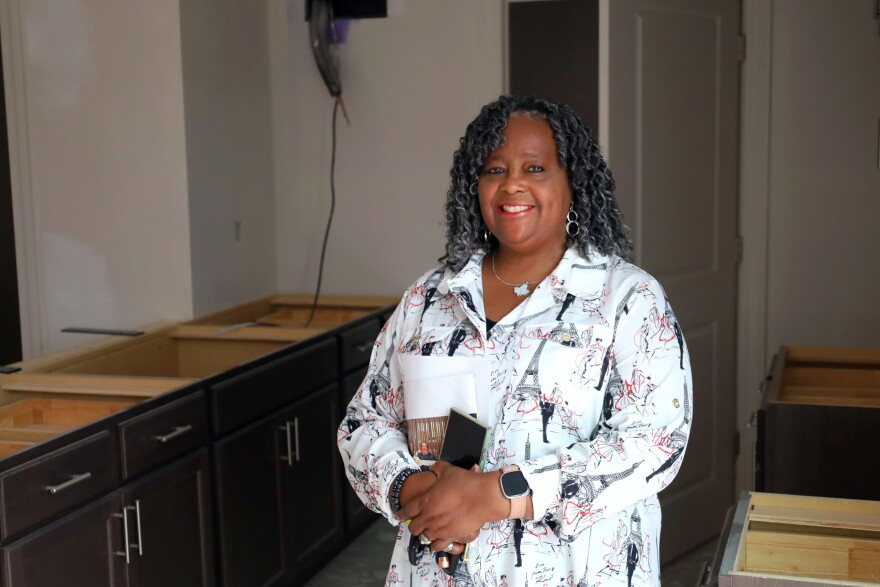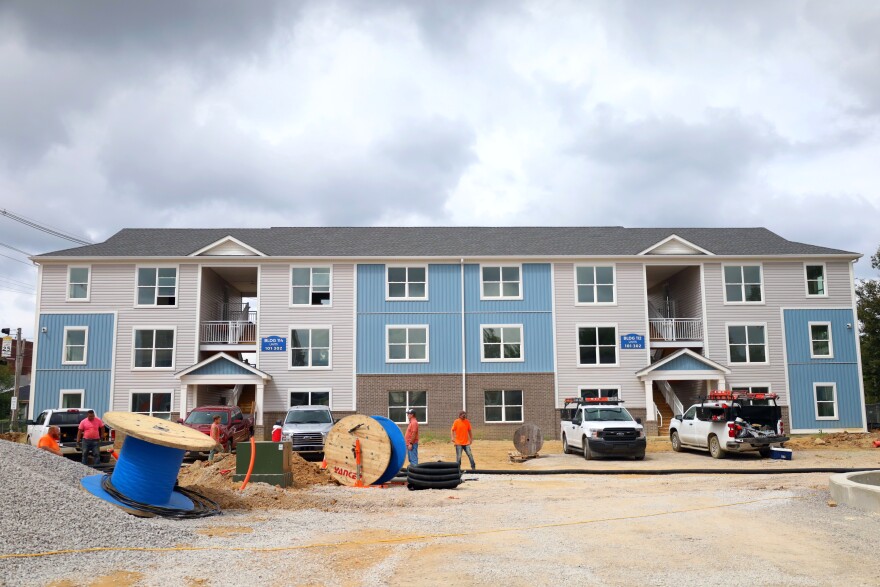The Affordable Housing Trust Fund is Louisville’s main tool for addressing the growing affordability crisis.
The Trust Fund, which provides loans and grants to developers, has put more than $120 million toward new housing creation since its founding in 2008. These apartments and single-family homes are available to people on the lowest incomes. Many of them struggle to find places they can afford. As of last year, that’s a quarter of residents in Louisville Metro.
Christie McCravy, executive director of the Affordable Housing Trust Fund, said there’s a broad spectrum of people who struggle with housing stability: working families, seniors on fixed incomes, veterans and people with disabilities.
“I think people have this image of who needs affordable housing, but the reality is that it’s every community,” she said. “There are tangible benefits.”
McCravy said expanding the supply of affordable housing has knock-on effects across the community. It helps businesses have a stable workforce, it helps reduce crime and it can transform neighborhoods that have been impacted by foreclosures and a glut of vacant and abandoned properties.
While it’s become more common for new developments in Louisville to include an affordable housing component, especially when developers are asking for some type of public subsidy, those units are often for people making 80% of the area median income, or $77,000 for a family of four.
The Trust Fund, meanwhile, focuses its resources on projects for people with the lowest incomes — 50% and 30% of the median income and below. According to Louisville’s most recent housing needs assessment, there’s a shortage of more than 50,000 housing units for people in those income brackets.
While the city has steadily increased its financial support for the Affordable Housing Trust Fund since its inception, Metro Council pulled back on funding earlier this year. Some council members have questioned its tactics and the lack of financial returns.
The Trust Fund says those concerns are grounded in a misunderstanding of how funding for affordable housing development actually works.
‘Our uninvested neighborhoods’
On West Market Street in the Shawnee neighborhood, four apartment buildings are nearing the end of construction. The Portshaw Apartments development will have 38 units, serving a mix of families and seniors.
“As you can see, it's really moving along,” McCravy said on a recent trip to the site. “It’s two-stories high, which I prefer. When you have steps, these are for families. The bottom floor will be for seniors”
McCravy grew up in Shawnee and as she looked around at the workers putting the finishing touches on the exterior of the brick and vinyl buildings, she remembered the heyday of this stretch of West Market.
“Years ago, when I grew up, in the ‘60s and ‘70s, there was a KFC over there,” she said. “This was a YMCA. It hadn’t been in operation for years.”
The properties were vacant by the time the Portland Memorial Missionary Baptist Church began purchasing them in the early 2000s. The neighborhood still has some fast-food restaurants and a gas station, but McCravey said she hopes the project can be a catalyst for revitalization.
“It just shows some of the reinvestment in our uninvested neighborhoods,” she said.
All of the units in the Portshaw project will be reserved for people making 50% of the area median income or less. That's an annual income of about $48,000 dollars for a family of four.
“You can understand why a family of four making $48,000 a year needs some kind of break on the rent,” McCravy said. “And that’s gross income.”
The Portshaw Apartments were only made possible because of money from the Trust Fund, she and others said.
Investing in the community
Portland Memorial Missionary Baptist Church is partnering with Rebound, Inc. on the Portshaw project. It’s the nonprofit affordable housing development company that was founded in 1993 by the Louisville Urban League, the city and Main Street Realty.
Kevin Dunlap, Rebound's president, said developing affordable housing can be much more difficult than building market-rate apartments or homes. That’s because there’s often a big difference between the cost to build and what you can reasonably earn back from renters.
“If they can't pay a lot of rent, the developer doesn't have enough money to pay the bank for this large loan to cover the expenses of the project,” Dunlap said.

Dunlap said developers have to get creative: Banks will only loan out what renters can pay back, so they try to get federal funding, stack on a grant from a nonprofit and then go to the Trust Fund to fill the gap.
Dunlap said it’s possible to have five or six different funding sources on a single project.
“That's not unusual at all,” he said.
When there’s still a gap between funding and the cost to build, the Affordable Housing Trust Fund can be the final piece of the puzzle.
The Trust Fund put in $5.2 million to make the Portshaw Apartments happen.
Dunlap has been working in the space for nearly three decades. He was a board member of the Affordable Housing Trust Fund and also sat on the opposite side of the table, serving as senior deputy director of Fannie Mae in Kentucky in the early 2000s.
Today, Dunlap said, there’s very few organizations left that can provide the level of funding that the Affordable Housing Trust Fund can.
“Developers always relied on federal pass-through funds that came through the city, like HOME dollars or the Community Development Block Grant,” he said. “But over time the amount that this city has gotten has dwindled.”
Dunlap said he remembers a time when as much as $20 million was coming to Louisville from the federal government each year to subsidize affordable housing. Now, those same funding streams are less than $5 million.
“That is definitely not nearly enough, not even for one major project,” Dunlap said.
At the same time federal funding is getting tighter, the Affordable Housing Trust Fund has been getting more money into the community.
A decade ago, city officials were allocating $1 million a year to the Trust Fund. That increased to $2.5 million in 2017. And it’s received at least $10 million each year since 2021.
Dunlap said loans from the Trust Fund can be repaid over a longer period of time. And half or all of the loan can sometimes be forgiven.
“Which is another good thing about having the Trust Fund, because the banks are always wanting to be first,” Dunlap said. “Trust Fund has the ability to subordinate, to come behind the lenders.”
While developers see that as a plus, some city officials have criticized the Trust Fund for not getting back everything they’re lending out.
In the city’s current budget, which runs through next July, Louisville Metro Council allocated $12.5 million to the Trust Fund, down from $15 million the year prior. It was the first time the city decreased its contribution since 2020.
In addition to the cut, Metro Council required the Trust Fund to provide a rundown of current projects and any unspent funding. They also asked its staff to evaluate different approaches, like revolving loans versus subsidies.

Republicans, like Budget Chair Kevin Kramer, said they wanted to take a step back after steadily increasing funding for affordable housing over the last decade.
“They’ve just had a lot of cash coming in over the last three years and that can get overwhelming,” Kramer told LPM News in June. “So what we’re doing is just saying, ‘Hold on. Let’s see where the money is, see what the programs are, let’s see what’s working.’”
Christie McCravy, who heads the Trust Fund, said much of the concern is predicated on a misunderstanding of how they operate. Almost all of the money they give out are loans, even if some could be forgiven with certain conditions.
McCravy said the Trust Fund gets paid back pretty quickly on single-family home projects, where developers make their money as soon as the house sells. Loans for apartments take much longer to get repaid.
She said affordable housing itself, and the longer periods of low rent that come from the forgivable conditions, are a form of payback, too.
“That's an investment in our community,” she said. “There's still a rate of return, even though it's not principal, dollar for dollar, getting it back.”
McCravy said some of the criticism of the Trust Fund also stems from the belief that they are sitting on a bunch of unspent funding. It may look that way, she said, because it can take developers years to stack up all of their income streams before getting shovels in the ground.
The Trust Fund has awarded $124 million to various affordable housing developments. About $19 million of that had been set aside for specific projects but had not been drawn down by developers yet, according to data provided to LPM News from Sept. 30, 2025.
The Trust Fund currently has about $380,000 in funding that hasn’t been obligated, but McCravy says none of that is “in the bank.” She said the city keeps all of the money allocated to the Trust Fund. It advances money to them for specific projects or provides reimbursement.
Providing opportunities and hope
Louisville’s Affordable Housing Trust Fund receives dozens of applications each year from developers.
Even when it’s getting higher levels of city funding, there are always more proposals than money available. That means McCravy and her board have to look at everything.
“Is the budget reasonable? Are these numbers realistic?” McCravy explained. “We look at the scope, the specifications, so what's the project going to look like?”
McCravy said they examine whether the proposal makes financial sense and if the planned apartments or homes are in line with the look of the surrounding neighborhood. They’re also figuring out how to have the biggest impact.
In the case of the Portshaw Project, Portland Memorial Missionary Baptist Church plans to provide services to residents who move in.
Pastor Stephen Smith said the church already runs after-school and summer programs for kids, as well as a food pantry.
He said the church will connect tenants to financial literacy classes and ask them to work on their credit scores, with the goal of eventually moving into homeownership.
“We want to do whatever we can to provide opportunities and hope in this community and help enhance and live the lives of the people who live here,” Smith said.
Smith said his congregation wants the Portshaw Apartments to be more than just housing, they want it to be a stepping stone for lifting families out of poverty. He said the project already has people in the neighborhood buzzing. The 38-unit complex currently has a waitlist of over 100 individuals and families.
“You're looking at a community that hasn't had a major development in years,” he said. “You're talking about something that people can see and say, ‘Oh, there is some hope.’”
Smith said none of this would be possible without their partner on the Portshaw Apartments, Rebound, Inc., and the help of the Affordable Housing Trust Fund.







